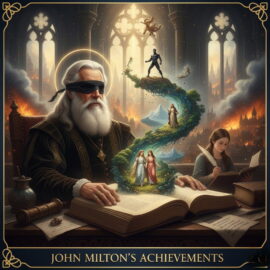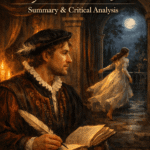Introduction: The Stage as a Platform for Ideas George Bernard Shaw revolutionized the English stage during the late nineteenth century. He transformed the popular theatre from a venue for mere entertainment into a forum for serious social and intellectual debate. Read More …
Robert Bridges as Poet: A Study in Craft and Classicism
Introduction: The Laureate of Measured Verse Robert Bridges occupies a unique position in the history of English literature. He served as Poet Laureate for a remarkable 24 years, influencing several generations of poets. Consequently, his work emphasizes classical restraint, technical Read More …
Walter de la Mare as Poet – A Critical Study
Introduction: A Whisperer of Dreams and Shadows Walter de la Mare remains a singular voice in early twentieth-century poetry. His work forms a necessary bridge between Romantic lyricism and modern psychological depth. Consequently, he maintained a profound commitment to traditional Read More …
Alfred Edward Housman as Poet of the Edwardian Period
Introduction Alfred Edward Housman as poet emerged from an intensely academic background environment successfully. Yet, this setting seemed entirely at odds with the potential for lyrical poetic expression always. Indeed, he was born in 1859. Consequently, he achieved widespread fame Read More …
Henry James as Literary Critic of the Edwardian Period
Introduction Henry James as Literary Critic of the Edwardian Period fundamentally redefined the novel’s theoretical landscape keenly. His critical work, primarily his Prefaces, became the Foundational Novel Theory of Modernism effectively. Therefore, he insisted on treating fiction as a serious, Read More …
Ford Madox Ford as Novelist of the Edwardian Period
Introduction Ford Madox Ford as Novelist of the Edwardian Period began his career as a Transitional Writer keenly. He bridged the formal tradition of the Victorians with emerging Modernism successfully. Therefore, he pioneered literary techniques that redefined the 20th-century novel Read More …
Katherine Mansfield as Short Story Writer-The Edwardian Period
Introduction Katherine Mansfield as short story writer redefined the literary form fundamentally. She emerged as a major voice during the Edwardian Period keenly. Therefore, she rejected traditional Victorian narrative structures effectively. Moreover, she prioritized the internal, subjective experience constantly. In Read More …
James Matthew Barrie as Novelist and Playwright
Introduction James Matthew Barrie as Novelist and Playwright describes a major literary figure of the Edwardian age. He successfully blended nostalgic Scottish realism with profound theatrical fantasy. His immense talent gave the world the immortal character, Peter Pan, quickly. Therefore, Read More …
Arnold Bennett as Novelist-The Edwardian Period
Introduction Arnold Bennett as Novelist describes a major literary figure of his era. He chronicled the inner and outer lives of the English middle class. His profound literary talent shaped Edwardian realism significantly. He successfully bridged Victorian traditions with modern Read More …
John Galsworthy as Novelist and Playwright-The Edwardian Period
John Galsworthy as Novelist and Playwright John Galsworthy as Novelist and Playwright describes a major literary figure. He successfully mastered two distinct, challenging creative forms. His influential writing shaped English culture significantly. He holds a truly unique place in 20th-century Read More …




